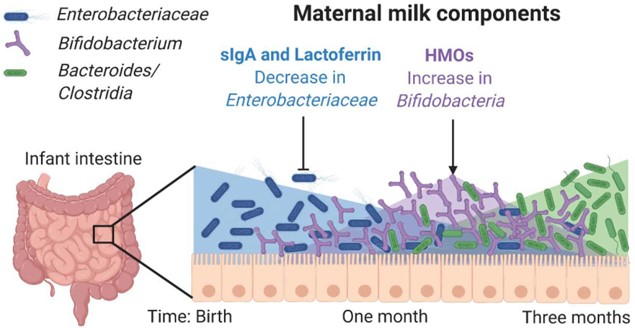A newborn is protected against certain digestive and respiratory infections by IgA received via the mother:
Blood.
Placenta.
Milk.
Intestine.
The Correct Answer is C

A newborn is protected against certain digestive and respiratory infections by IgA received via the mother’s milk.
IgA is the main antibody found in breast milk, and it coats and seals the baby’s respiratory and intestinal tract to prevent germs from entering the body and bloodstream.
Choice A is wrong because the blood does not contain IgA, which is the main antibody that protects mucosal membranes.
Choice B is wrong because the placenta does not transfer IgA to the fetus, but only some other antibodies such as IgG.
Choice D is wrong because the intestine does not produce IgA in newborns, as they are born with low levels of IgA.
Nursing Test Bank
Naxlex Comprehensive Predictor Exams
Related Questions
Correct Answer is D
Explanation
It is measured as part of a blood test and depends on the number and size of red blood cells. It is normally 40.7–50.3% for males and 36.1–44.3% for females.
Red blood cells contain hemoglobin, which transports oxygen and nutrients to the cells and tissues of the body.
Choice A is wrong because the color of plasma is not hematocrit.
Plasma is the liquid part of blood that carries blood cells and other substances.
Choice B is wrong because hematocrit is not a disease.
It is a test that can indicate conditions such as anemia or polycythemia.
Choice C is wrong because hematocrit is not a clotting factor.
Clotting factors are proteins that help the blood to clot and prevent bleeding.
Correct Answer is B
Explanation
Kidneys are not part of the lymphatic system.
The lymphatic system is a network of vessels and organs that drain excess fluid from the tissues, transport fats and immune cells, and protect the body from infections.
Kidneys are part of the urinary system, which filters blood, regulates fluid and electrolyte balance, and produces urine.
Choice A is wrong because kidneys do not have a direct connection to the lymphatic system.
Although kidneys have lymphatic vessels in their cortex, they do not originate from the lymphatic system.
Kidneys receive blood from the renal arteries and return it to the renal veins.
The lymphatic vessels in the kidney cortex drain interstitial fluid and immune cells from the kidney tissue to the regional lymph nodes.
Some additional sentences are:
Choice B is right because kidneys are part of the urinary system, not the lymphatic system.
The urinary system and the lymphatic system have different functions and structures in the body.
Normal ranges for kidney function tests include blood urea nitrogen (BUN) of 7 to 20 mg/dL, serum creatinine of 0.6 to 1.2 mg/dL, and glomerular filtration rate (GFR) of more than 90 mL/min/1.73 m.
Normal ranges for lymphatic system tests include white blood cell (WBC) count of 4,000 to 11,000 cells per microliter, lymphocyte count of 1,000 to 4,800 cells per microliter, and immunoglobulin levels of IgG (700 to 1,600 mg/dL), IgA (70 to 400 mg/dL), IgM (40 to 230
mg/dL), IgE (0 to 100 IU/mL), and IgD (0.5 to 5 mg/dL).
Whether you are a student looking to ace your exams or a practicing nurse seeking to enhance your expertise , our nursing education contents will empower you with the confidence and competence to make a difference in the lives of patients and become a respected leader in the healthcare field.
Visit Naxlex, invest in your future and unlock endless possibilities with our unparalleled nursing education contents today
Report Wrong Answer on the Current Question
Do you disagree with the answer? If yes, what is your expected answer? Explain.
Kindly be descriptive with the issue you are facing.
